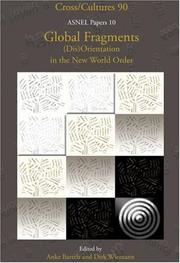| Listing 1 - 6 of 6 |
Sort by
|
Book
ISBN: 3631302452 Year: 1996 Publisher: Frankfurt am Main Lang
Abstract | Keywords | Export | Availability | Bookmark
 Loading...
Loading...Choose an application
- Reference Manager
- EndNote
- RefWorks (Direct export to RefWorks)
Book
ISBN: 9783476026743 3476026744 Year: 2019 Publisher: Stuttgart Metzler Verlag
Abstract | Keywords | Export | Availability | Bookmark
 Loading...
Loading...Choose an application
- Reference Manager
- EndNote
- RefWorks (Direct export to RefWorks)

ISBN: 9401204225 1429480823 9781429480826 9789401204224 9042021829 9789042021822 Year: 2007 Publisher: Amsterdam New York : Rodopi,
Abstract | Keywords | Export | Availability | Bookmark
 Loading...
Loading...Choose an application
- Reference Manager
- EndNote
- RefWorks (Direct export to RefWorks)
While the world seems to be getting ever smaller and globalization has become the ubiquitous buzz-word, regionalism and fragmentation also abound. This might be due to the fact that, far from being the alleged production of cultural homogeneity, the global is constantly re-defined and altered through the local. This tension, pervading much of contemporary culture, has an obvious special relevance for the new varieties of English and the literature published in English world-wide. Postcolonial literatures exist at the interface of English as a hegemonic medium and its many national, regional and local competitors that transform it in the new English literatures. Thus any exploration of a globalization of cultures has to take into account the fact that culture is a complex field characterized by hybridization, plurality, and difference. But while global or transnational cultures may allow for a new cosmopolitanism that produces ever-changing, fluid identities, they do not give rise to an egalitarian ‘global village’ – an asymmetry between centre and periphery remains largely intact, albeit along new parameters. The essays collected in this volume offer readings of literary, theoretical, and filmic texts from the postcolonial world. These texts are read as attempts to articulate the global with the local from a perspective of immersion in the actual diversity of life-worlds, focusing on such issues as consumption, identity-politics, and modes of affiliation. In this sense, they are global fragments: locally refractured figurations of an experience of world-wide interconnectedness.
Book
ISBN: 9783631571972 3631571976 Year: 2007 Volume: 5 Publisher: Frankfurt am Main ; Oxford : Peter Lang,
Abstract | Keywords | Export | Availability | Bookmark
 Loading...
Loading...Choose an application
- Reference Manager
- EndNote
- RefWorks (Direct export to RefWorks)
Revolutions and socialism. --- Social sciences --- Révolutions et socialisme --- Sciences sociales --- Philosophy. --- Philosophie
Book
ISBN: 9004335196 9789004335196 9789004335035 900433503X Year: 2017 Publisher: Leiden ; Boston : Brill Rodopi,
Abstract | Keywords | Export | Availability | Bookmark
 Loading...
Loading...Choose an application
- Reference Manager
- EndNote
- RefWorks (Direct export to RefWorks)
Postcolonial Justice addresses a major issue in current postcolonial theory and beyond, namely, the question of how to reconcile an ethics grounded in the reciprocal acknowledgment of diversity and difference with the normative, if not universal thrust that appears to energize any notion of justice. The concept of postcolonial justice shared by the essays in this volume carries an unwavering commitment to difference within and beyond Europe, while equally rejecting radical cultural essentialisms, which refuse to engage in "utopian ideals" of convivial exchange across a plurality of subject positions. Such utopian ideals can no longer claim universal validity, as in the tradition of the European enlightenment; instead they are bound to local frames of speaking from which they project world.
Postcolonialism in literature. --- Postcolonialism in literature --- Law
Book
ISBN: 9783631542262 Year: 2005 Publisher: Frankfurt am Main Lang
Abstract | Keywords | Export | Availability | Bookmark
 Loading...
Loading...Choose an application
- Reference Manager
- EndNote
- RefWorks (Direct export to RefWorks)
| Listing 1 - 6 of 6 |
Sort by
|

 Search
Search Feedback
Feedback About UniCat
About UniCat  Help
Help News
News